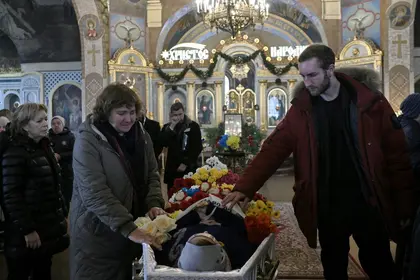Family and friends wiped away tears Friday beside the coffin of Lyudmyla Shevtsova, an 84-year-old scientist killed when a Russian missile attack smashed her flat in central Kyiv.
The ecologist was one of the two people killed on Tuesday during a massive Russian attack firing hypersonic missiles on the Ukrainian capital.
JOIN US ON TELEGRAM
Follow our coverage of the war on the @Kyivpost_official.
One missile fell in the yard of her block of flats causing a powerful explosion and setting off fires that injured more than four dozen people.
The crater outside measured six meters, a resident told AFP.
Soldiers' funerals have become part of everyday life in Kyiv but civilian deaths are rarer in the capital and the victims' identities are not always made public.
Shevtsova, a university professor who was still teaching well into retirement age, was mourned by former colleagues, students and family at an Orthodox Christian service at the yellow-painted Holy Intercession Cathedral near her home.
Relatives and friends mourn at a church in Kyiv on Jan. 5, during the funeral service of Lyudmyla Shevtsova, an 84-year-old scientist who was killed at her apartment on Jan. 2. PHOTO: AFP
Her granddaughter Daryna Gulei, a 28-year-old architect, said that she and her mother managed to say goodbye to Shevtsova in the ambulance after she was rescued from her flat with serious injuries.
“But after she had said goodbye to my mother, it was obvious that she had passed away.”

‘Risk of Catastrophic Failure’: Watchdog Wants Monitors at Ukrainian NPPs Immediately
“They tried to resuscitate her, but unfortunately, there were a lot of injuries from shrapnel and shells and they could not help her.”
- 'Smashed to pieces' -
Shevtsova, who worked at Kyiv's Institute of Hydrobiology and then the ecology faculty of the Kyiv Mohyla Academy, was alone in her flat at the time.
Her windows looked onto the epicenter of the explosion, her granddaughter said.
“Everything in my grandmother's apartment was smashed to pieces.”
Local residents look from windows of a heavily damaged residential building, three days after a Russian missile attack in Kyiv, on January 5, 2024, amid the Russian invasion of Ukraine. PHOTO: AFP
Daryna said her parents live on the other side of the building which was much less damaged. Her father “miraculously survived,” after he had just visited Shevtsova, his mother-in-law, and told her to take care because of the missile threat.
“My grandmother was indeed a great person in the world of science, and for all of us,” her granddaughter said tearfully outside the church.
“My sister and I often joked with each other that we have a ‘diplomat granny,’ because she always knew how to find the right word. She knew how to resolve any conflict.”
Ostap Nezruch, an ecology professor and photographer, described his colleague, whose office was opposite his, as “both demanding and gentle.”
The gray Soviet-era block of flats where Shevtsova lived became a hive of activity as volunteers and municipal workers rushed to block up windows with chipboard and planks amid freezing temperatures and snow.
On Friday, some were cutting plywood. Others welded pipes and swept up broken glass.
Someone had affixed a Ukrainian flag to the playwood in one window.
Some residents were being allowed back inside to see the damage and collect belongings, supervised by police with loudhailers.
- 'A great professor' -
One woman emerged with perspex boxes of toys. Another carried two carryalls.
Construction vehicles were clearing debris from around the building – tree branches, smashed furniture, a fridge and even a stuffed toy lion.
A woman carries belongings out of a heavily damaged residential building on Jan. 5, three days after a Russian missile attack in Kyiv. PHOTO: AFP
Cars with dents and smashed roofs had plastic wrapped around them to keep out rain and snow.
After the funeral, a couple of Shevtsova’s former students came to see where their teacher had lived.
“She taught us about hydrology, biology, ecology. She was a great professor,” said Anastasia Skok, 26, an ecologist.
Shevtsova focused on the Dnipro and Dniester Rivers, writing many scientific papers, Skok said.
“When the Russians are killing Ukrainian civilians, they are also killing Ukrainian scientists and the Ukrainian elite.”
You can also highlight the text and press Ctrl + Enter









